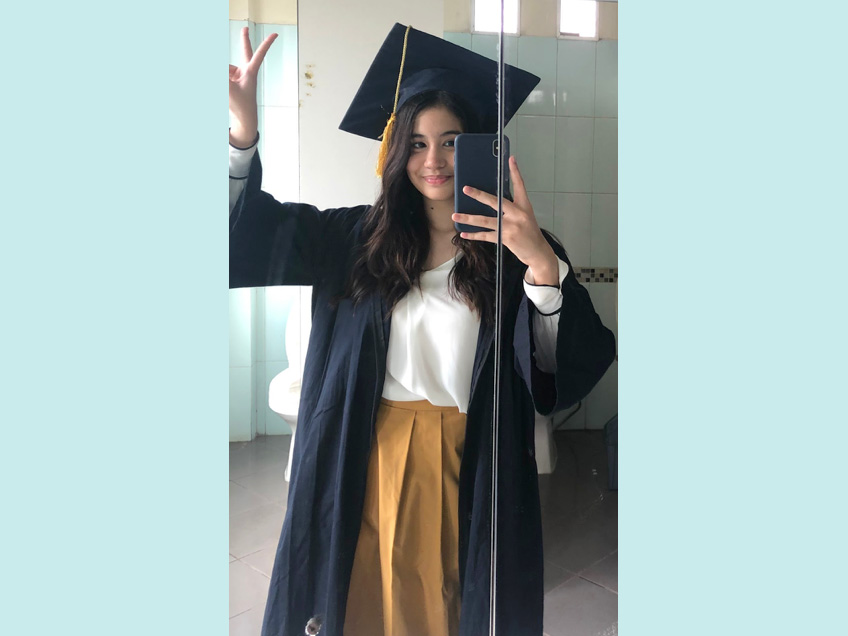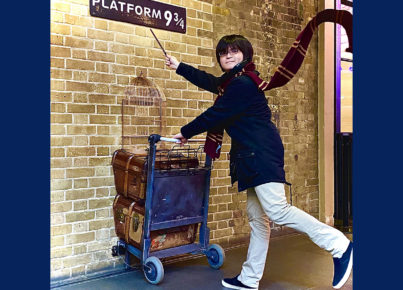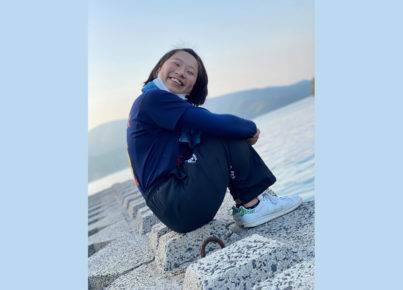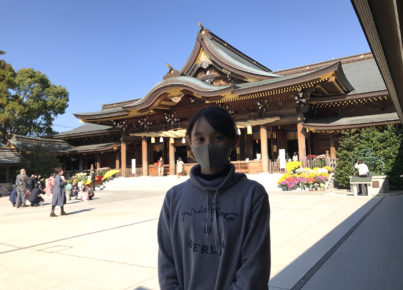“Career Finding : Passion or Pragmatic ?”
Arla Ailani Muchtar
Gap Year (planning on taking Literature and Political Science)
Indonesia
“Here is a small fact, you are going to die.” The opening lines of Markus Zusak’s New York Times Bestseller have stayed with me since I first read it as a twelve-year-old girl with aspirations to become a lawyer. In fact, those lines weren’t the only part of the story I was drawn to. I soon became obsessed with the idea of mortality and the fragility of life; a heavy and macabre topic for a girl so young. However, I don’t think I’ve ever really understood the weight of that line until the end of high school when I revisited the novel. Reading the novel and those opening words made me think about what I wanted to do with my life and whether or not I would be happy at the end of it. So to answer your question, my dream is to simply be able to look back at my life at the end of it and feel content, fulfilled, and happy.
I wanted to be many things growing up. I was particularly drawn towards government and civil services. So naturally, at the ripe age of eight, I decided I was going to become a lawyer. I am a natural planner so I had made myself an action plan on how I was going to achieve this goal. I decided that I was going to go to Harvard Law School after graduating high school and then pursue a career in law similar to my biggest inspirations, Elle Woods (from the 2001 cult classic, Legally Blonde) and Judge Ruth Bader Ginsburg. This was my goal for a long time. Most of my academic years were spent talking and in mental preparation for Harvard and law school. I was nothing if not aspirational and my family was nothing if not supportive of this dream; I was often told that my argumentative nature would help me in pursuit of this career. To support this career choice, I became heavily involved in my school’s Model UN Club as well as volunteered as head of the Global Issues Network Club. Both these clubs helped me by allowing me to learn how to become a good leader and also practice my public speaking, debate and research skills; all of which would be very useful in the law profession. A key part in why I was so involved in Model UN was the connections and friends I would make when I joined a conference. This was also why I decided to take part in the Toshiba Youth Club Asia program that took place last December.
My experiences during the TYCA program was a major turning point in my life, both emotionally and career-wise. Although I was extremely passionate about social justice and environmental issues, I felt stagnant and bored with debating and defending laws I didn’t necessarily believe in the months leading up to TYCA. Instead, I found joy in literature and the arts. I still loved debating, but now I was passionate about debates and discussions about books and movies and how they mirrored and/or criticized the problems in our society. In the time spent in Tokyo, I realized that I wasn’t meant to become a lawyer or a diplomat or anything of that sort. The topics being discussed, although important and relevant, isn’t something I could carry in daily conversations for the rest of my life. On the other hand, TYCA built back the self-confidence I had lost by allowing me to meet and make friends with different people from all over ASEAN and Japan.
Following my return back from Tokyo, I had realized that I would rather pursue the arts compared to politics. I was already constantly reading, writing, painting and playing music as a hobby so it wasn’t hard to convince my parents to allow me to choose an art major. (It also helps that both my parents are actors and know how to support me in the field of arts.) I continued to do Model UN until I graduated and still was the head of the Global Issues Network club at my high school. Although I didn’t truly enjoy these clubs anymore, it was useful to practise my leadership and public speaking skills since they would be useful in any job I choose to pursue.
As of now, I am a high school graduate and am currently taking a gap year. I plan to study abroad for university and will major in English Literature and Political Science. I decided on taking a gap year due to the COVID-19 pandemic. Since my final months of high school were done in isolation, I know my limitations when it came to online learning and settled on waiting until in-person classes started again since I am more productive in a face-to-face classroom setting. While waiting out the pandemic, I have been taking acting classes and am planning on working as an actress to make money so I can help my parents pay for my college tuition. I am still writing stories and reading books and hopefully will be able to publish my works through an online literary magazine.
As Markus Zusak said, we are going to die. So when asked about my dreams I try to be as idealistic as possible and this applies to my career choices. Although becoming a lawyer would be admirable, I find no joy in spending my life sitting in offices and courtrooms. However pursuing an artistic career, whether that would be a writer, journalist or actress, would allow me to spend everyday learning and broadening my horizons while being able to fully express myself. It has been said many times that education does not end after graduation and since I have spent every day in the last six months constantly reading and improving my writing skills, I can fully agree with that statement and I can only hope that all the skills and habits I have accumulated over the years will help me in reaching my goals.
「ここに小さな事実がある。 君は亡くなる」 マーカス・ズーザックのニューヨーク・タイムズ・ベストセラーの冒頭のセリフは、弁護士になることを夢見ていた12歳の少女だった私がが初めて読んだ時から、心に残っています。実際、私が惹かれたのはこのセリフだけではありません。若い女の子にとっては、重くて不気味なテーマである「死」と「命のもろさ」に、すぐに夢中になってしまいました。しかし、高校の終わりに小説を読み直すまでは、このセリフの重さを本当に理解していたとは思えません。小説を読んで、そしてその冒頭の言葉を読んで、自分の人生をどうしたいのか、人生の終わりに幸せでいられるのかどうかを考えました。その質問に答えると、私の夢は、人生の最後に自分の人生を振り返って、満足感や充実感、幸せを感じられるようになることです。
私は多くのものになりたいと思っていました。特に政府の職員や公務員に憧れていました。そのため、8歳の時に自然と弁護士になることを決意しました。私は計画を立てることに非常に長けているので、この目標を達成するための行動計画を自分で立てました。私は高校を卒業した後、ハーバード大学のロースクールに行き、その後、私がこれまでに最も刺激を受けた、エル・ウッズ(2001年 映画 キューティーブロンドの主人公)とアメリカ合衆国の判事である、ルース-ベイダー-ギンズバーグが歩んだような法律のキャリアを極めることにしました。これは長い間、私の目標でした。学校に通っている間、ハーバード大学や法科大学院への進学に向けて、話をしたり、精神的な準備をしたりして過ごしていました。もし大きな目標もなく、家族にも恵まれず、私の夢に対する支援もなかったならば、私自身、何者にもなれなかったと思います。私はしばし、議論好きな私の性格は弁護士向けであると言われていました。弁護士になるという夢の実現に向けて、私は学校の模擬国連クラブに参加したり、グローバル・イシュー・ネットワーク・クラブの代表としてボランティア活動に参加したりしました。これらのクラブでは、優れたリーダーになるための方法を学び、人前で話すこと、討論そして調査のスキルを磨くことができました。そして、これらのスキルは全て弁護士の仕事でとても役立ちます。模範国連に参加した最も大きな理由は、会議に参加した時にできる人脈と交友関係でした。また、昨年12月に行われた東芝ユースクラブアジアプログラムに参加することを決めた理由でもあります。
TYCAプログラムでの経験は、精神的にもキャリア的にも人生の大きな転機となりました。私は社会的正義や環境問題に非常に情熱を持っていましたが、TYCAに参加するまでの数ヶ月間は、個人的に賛同できないような法律について討論や擁護をすることに閉塞感と退屈さを感じていました。その代わりに、私は文学や芸術に喜びを見出しました。私は今でも討論をすることが好きです。ただ、今では本や映画について話をしたり、本や映画が私たちの社会の問題をどのように映し出したり、批判したりするかについての議論を好みます。東京で過ごした時間の中で、私は自分が弁護士や外交官には向いていないことに気付きました。議論されているトピックは、重要なことばかりでしたが、日常会話の中で常に気軽に自分の一部として話ができるようなことか、と言えばそうではないと思いました。その一方で、TYCAでは、ASEANや日本各地の様々な人たちと出会い、友達を作ることができ、失っていた自信を取り戻すことができました。
東京から帰国後、私は政治よりも芸術の道に進みたいと考えていました。政治と芸術を比較したとき、芸術の道を追求したいと思いました。すでに読書、執筆、絵画、音楽を趣味にしていたので、両親を説得して美術を専攻することを許可してもらうのは難しいことではありませんでした。(両親が俳優であり、芸術の分野でのサポートの仕方が分かっていたことも助かりました)。私は卒業するまで模擬国連を続け、高校ではグローバル・イシュー・ネットワーク・クラブの部長をしていました。その時は部活を心からに楽しむことはもはやできなくなりましたが、リーダーシップや人前で話すスキルは、今後どのような仕事に就くにしても役立つので、そういったことを部活で実践できてよかったです。
現在、私は高校を卒業し、ギャップイヤー(高校卒業後、大学に入る前に自己研鑽をする期間のこと)の真っ只中です。大学では、英文学と政治学を専攻し、留学する予定です。私がギャップイヤーを取ることにしたのは、COVID-19のパンデミックのためです。高校の最後の数ヶ月は孤立の中で授業を受けていました。そのことから、オンライン学習には自分の限界があることが分かり、対面授業の方が生産性が高いので、対面授業が再開されるのを待つことにしました。パンデミックが立ち去るのを待っている間、私は演技のクラスを取っていて、演技で収入を得ることを計画しています。そうすることで、大学の学費の足しにすることができるからです。今も物語を書いたり、本を読んだりしていますが、何とかオンラインの文芸誌で作品を出版することができれば、と思っています。
マーカス・ズーザックが言ったように、私たちは皆亡くなります。だから、夢について聞かれたとき、私はできるだけ理想的になろうとしていますが、これは私のキャリアの選択にも当てはまります。弁護士になることは立派なことですが、私はオフィスや法廷に座って人生を過ごすことに喜びを見いだせません。しかし、作家であれ、ジャーナリストであれ、女優であれ、芸術的なキャリアを追求することで、自分を十分に表現しながら、日々学び、視野を広げていくことができると思います。教育は卒業して終わりではないと繰り返し言われています。私はこの半年間毎日本を読み、文章力を高めてきましたので、その言葉に全面的に賛同します。そして、長年培ってきたスキルや習慣が自分の目標達成に役立つことを願うばかりです。








